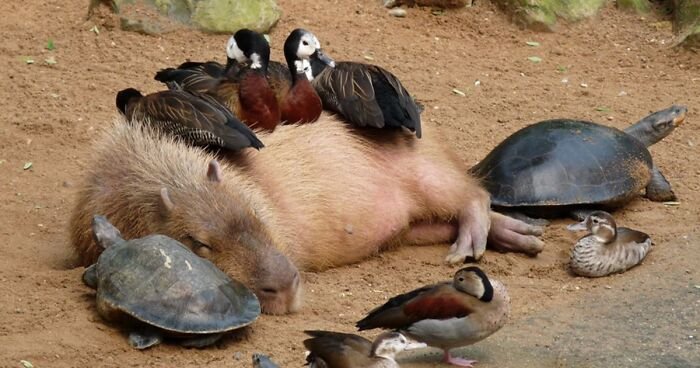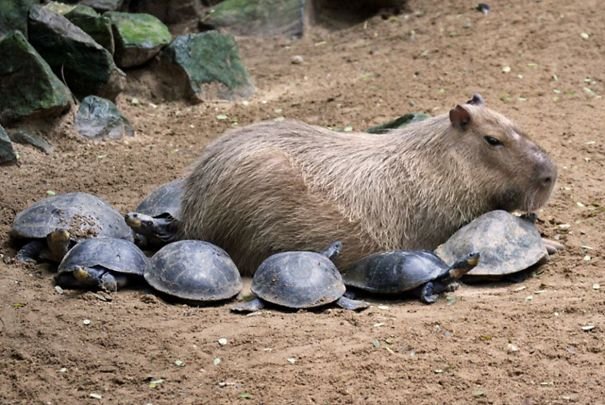Table of Contents
Imagine having a pet that gets along effortlessly with every animal it encounters, from ducks to monkeys and even turtles. That’s the beauty of the capybara, a creature famous for its amicable nature. With its gentle disposition and unwavering ability to make connections, the capybara has become the perfect companion for a wide array of animals, fostering harmonious bonds in the animal kingdom. Whether they’re sharing a cozy nap or engaging in playful water antics, the capybara’s affable personality knows no bounds, proving that friendship truly knows no limits in the animal world.

1. Capybara’s Friendly Nature
Capybaras are known for their friendly and sociable nature, which makes them an excellent choice as companion animals. Their physical appearance, behavior, and social structure all contribute to their amiable demeanor.
1.1. Physical Description
Capybaras are the largest rodents in the world and can grow up to 4 feet in length and weigh around 100 pounds. They have a stocky body with short legs and a long, distinctive muzzle. Their fur is coarse and varies in color from reddish-brown to gray, providing them with excellent camouflage in their natural habitats.
1.2. Behavior
One of the key characteristics of capybaras is their docile and gentle behavior. They are highly sociable animals and thrive in groups, commonly known as herds. Capybaras have a laid-back temperament and are known for their friendly and tolerant nature towards humans and other animals.
1.3. Social Structure
Capybaras have a strong sense of social organization within their herds. They have a hierarchical structure, with a dominant male leading the group. Other members of the herd follow a clear order of rank, with each individual having their own role and responsibilities. This social structure helps promote cooperation and overall harmony within the group.
2. Benefits of Capybara as a Companion Animal
Having a capybara as a companion animal can bring numerous benefits to both you and other animals. Their friendly nature and sociability make them an ideal choice as a non-traditional pet.
2.1. Emotional Support
Capybaras are incredibly affectionate animals and can provide a tremendous amount of emotional support to their human companions. Their calming presence and ability to sense emotions make them ideal therapy animals for individuals struggling with anxiety, depression, or other mental health conditions. Their gentle nature and willingness to cuddle can help provide comfort and a sense of security.
2.2. Encourages Positive Social Behavior
If you have other pets in your household, introducing a capybara can have a positive influence on their social behavior. Capybaras have a unique ability to bond with and befriend animals from different species. Their gentle and accepting nature can help animals who may be hesitant or fearful of forming relationships with others. This can be particularly beneficial for shy or anxious pets, helping them develop more confidence and social skills.
2.3. Helps Reduce Stress and Anxiety
The presence of a capybara can create a soothing and stress-free environment. Research has shown that interactions with animals, such as petting or spending time with a capybara, can lower cortisol levels (a stress hormone) and promote relaxation. Their calming influence can provide a sense of tranquility and help reduce anxiety, benefiting both you and your other pets.
2.4. Promotes Physical Activity
Keeping a capybara as a companion animal can also encourage physical activity and exercise. Capybaras need ample space to roam and explore, which can motivate you and your other pets to engage in more physical activities. Whether it’s going for walks together or playing in a secure outdoor area, the presence of a capybara can promote a more active lifestyle for everyone involved.

3. Capybara’s Compatibility with Other Animals
Capybaras have a remarkable ability to form harmonious relationships with a variety of other animals. Their friendly nature and adaptability make them compatible companions for many different species.
3.1. Dogs
Capybaras generally have a good compatibility with dogs. However, it is crucial to introduce them gradually and under supervision to ensure a positive interaction. Proper training and socialization can help establish a respectful relationship and prevent any potential conflicts.
3.2. Cats
While capybaras and cats can coexist peacefully, it is important to remember that each animal has its own personality. Some cats may be more accepting of capybaras, while others may be less inclined to form a bond. Gradual introductions, providing designated safe spaces for each animal, and monitoring their interactions are necessary to ensure a harmonious relationship.
3.3. Birds
Capybaras typically have a peaceful coexistence with birds. However, caution should be exercised with smaller bird species, particularly if they exhibit behaviors that may provoke or stress the capybara. Monitoring their interactions and providing separate spaces for each animal is essential to ensure their well-being.
3.4. Rabbits
Capybaras and rabbits can generally get along well, especially when introduced at a young age. Both species have similar social structures and enjoy each other’s company. However, it is important to provide enough space and resources to accommodate both animals’ needs.
3.5. Guinea Pigs
Capybaras and guinea pigs are closely related and can form strong bonds. They typically share similar diet and habitat requirements, making it easier to provide a suitable environment for both animals. As with any interspecies relationship, it is important to introduce them gradually and monitor their interactions to ensure a positive connection.
3.6. Reptiles
Capybaras generally have limited compatibility with reptiles, as their social and environmental needs differ significantly. While it is possible for them to coexist in the same household, strict measures should be taken to ensure the safety of both animals. Separating their living spaces and closely monitoring their interactions is essential.
4. Capybara’s Care and Requirements
Caring for a capybara requires a thorough understanding of their specific needs. Providing a suitable environment, a balanced diet, regular exercise, grooming, and proper veterinary care are essential for their overall health and well-being.
4.1. Suitable Environment
Capybaras need ample space to roam and explore. Ideally, they should have access to a large, secure outdoor area and a shallow swimming pool, as they are semi-aquatic animals. The enclosure should be escape-proof and include plenty of hiding spots, shade, and vegetation. Additionally, it is important to adhere to local regulations and zoning ordinances regarding exotic pet ownership.
4.2. Diet
Capybaras are herbivores and have specific dietary requirements. Their diet should consist mainly of high-quality grasses and hay, supplemented with fresh vegetables, fruits, and commercial capybara pellets. It is important to provide them with a balanced and varied diet to ensure they receive all the necessary nutrients.
4.3. Exercise
Regular exercise is crucial for capybaras to maintain their physical and mental well-being. They are active animals that enjoy walking, swimming, and exploring their surroundings. Providing opportunities for exercise, such as walks on a leash or access to a secure outdoor area, is vital for their overall health.
4.4. Grooming
Capybaras have specific grooming needs to keep their fur and skin healthy. Regular brushing helps prevent matting and removes loose fur. Their teeth should be checked regularly, as they continuously grow, and appropriate chew toys should be provided to keep them in good condition.
4.5. Veterinary Care
Capybaras require regular veterinary check-ups to monitor their health and detect any potential issues early on. It is important to find a veterinarian experienced in exotic animal care and follow their recommendations for vaccinations, parasite control, and any necessary medical treatments. Regular dental check-ups are also crucial to ensure their teeth remain healthy.

5. Responsibilities and Considerations of Capybara Ownership
Owning a capybara comes with significant responsibilities and considerations. Before bringing a capybara into your life, it is important to be aware of the following:
5.1. Research and Education
Proper research and education are essential before deciding to own a capybara. Understanding their specific needs, behaviors, and requirements will help you provide the best care for your companion. Consider reaching out to capybara owners, joining online communities, or consulting with exotic animal experts to gather information and insights.
5.2. Legal and Permit Requirements
Capybara ownership is subject to legal and permit requirements in many jurisdictions. It is crucial to familiarize yourself with local regulations and obtain any necessary permits or licenses to ensure compliance with the law. Ignoring these requirements can lead to legal consequences and potential harm to the capybara.
5.3. Time Commitment
Capybaras require a significant time commitment. They need daily care, feeding, exercise, and social interaction. Additionally, their enclosures require regular cleaning and maintenance. Assess your schedule and ensure you can dedicate enough time to meet their needs before committing to capybara ownership.
5.4. Financial Commitment
Owning a capybara can be financially demanding. In addition to the initial cost of purchasing or adopting a capybara, there are ongoing expenses for their housing, dietary needs, veterinary care, and other supplies. Consider your budget and ensure you have the financial resources to provide for their long-term care.
5.5. Long-term Commitment
Capybaras have a relatively long lifespan, ranging from 8 to 12 years in captivity. They require a lifelong commitment and should not be considered as temporary pets. Make sure you are prepared for the long-term responsibilities and care that come with capybara ownership before bringing one into your home.
6. Conclusion
Capybaras’ friendly nature and sociability make them wonderful companions for both humans and other animals. Their gentle demeanor, ability to provide emotional support, promote positive social behavior, reduce stress and anxiety, and encourage physical activity make them unique and rewarding companions. However, it is essential to understand their specific care requirements, ensure compatibility with other animals, and be fully prepared for the responsibilities and commitments that come with owning a capybara. By providing them with a suitable environment, proper diet, regular exercise, grooming, and veterinary care, you can enjoy a fulfilling and enriching relationship with your capybara companion.


